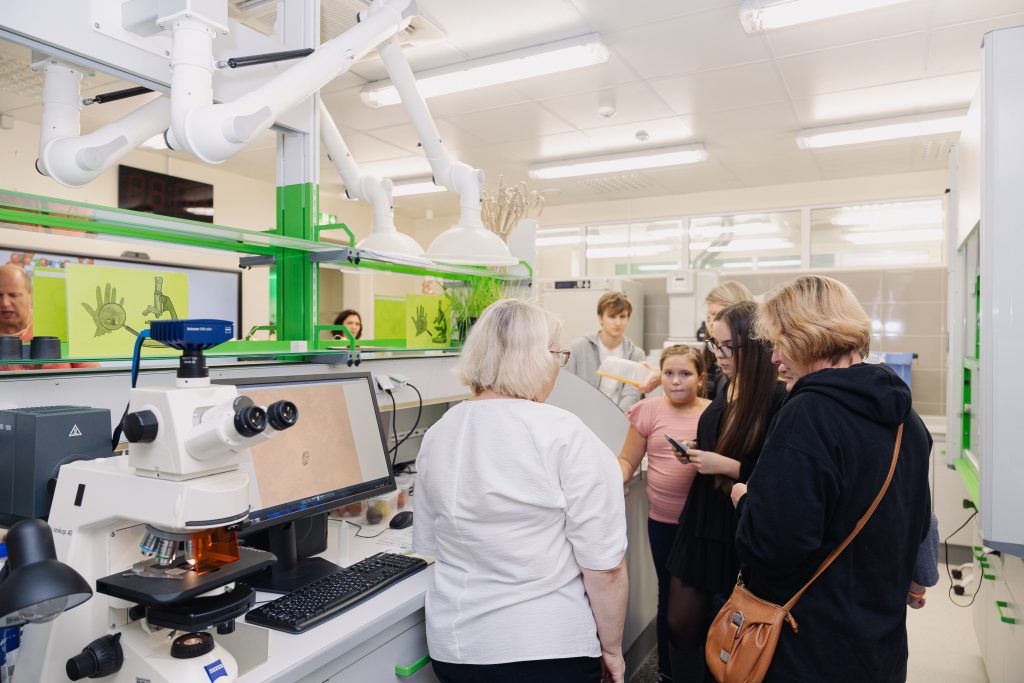
On September 27th Daugavpils University (DU) opened its doors for the annual European Researchers’ Night 2024, where the team of scientists, and general staff from the Institute of Life Sciences and Technology actively engaged in offering a variety of activities to the public. The event aimed to spark curiosity and educate people of all ages, presenting innovations, experiments, and hands-on workshops in various fields of science.
Activities offered by DZTI:
‘’Preparation of Fruit Flies (Drosophila melanogaster) for Laboratory Research’’ – Visitors were shown how fruit flies are bred and maintained in the laboratory. The demonstration included preparing fly food, modifying its composition, anesthetizing flies with CO2, and sorting them for research.
Led by Ronalds Krams and Tatjana Grigorjeva
‘’Hydrobiologist’s Mission’’ – In this activity, visitors had the opportunity to understand the role of a hydrobiologist in freshwater research and practically engage in water sample analysis.
Led by Aija Brakovska and Jana Paidere
‘’Following in the Footsteps of a Moss Researcher’’ – An interactive game that allowed all age groups to get acquainted with the basics of a moss researcher’s work and species identification.
Led by Līga Anna Leitāne, Dana Krasnopoļska, Dace Stepanova and Anna Mežaka
‘’Do You Know Any Invasive Plants? No?! Come, You’ll Be Surprised!’’- Visitors had the opportunity to see, touch, smell, and learn more about the most common invasive plants in Daugavpils. The activity was complemented by a card game about invasive species.
Led by Santa Rutkovska and Aiva Bojāre (Nature Conservation Agency)
‘’Biomass Energy: Innovations and the Future’’ – Participants were introduced to renewable energy production and waste management processes, such as biomass gasification and pyrolysis. Demonstrations showcased the products of these processes, and their potential applications were discussed.
Led by Sergejs Osipovs, Vladimirs Gusarovs, Mantas Meiliunas, Jevgenijs Dubovskis, and Romualds Radiševskis
‘’Chemistry for All!’’ – A variety of workshops allowed participants to explore the world of chemistry:
These activities allowed participants to discover hidden chemical processes and engage in exciting experiments.
Led by Aleksandrs Pučkins
‘’Marvelous Genetics’’ – In collaboration with the association “Animal Guardians,” a workshop explained the mysteries of genetics and why kittens in the same litter can look so different.
Led by Marina Savicka, Aleksandra Morozova, and Jeļena Oreha
‘’At the Forefront of Molecular Biology’’ – Visitors were offered a unique opportunity to familiarize themselves with equipment that is changing the world – from personalized medicine to plant genetic modification and the fight against diseases.
Led by Aleksandrs Petjukevičs
‘’Fruits, Vegetables, and Grains Also Get Sick’’ – Using a microscope, visitors could examine leaf damage on fruits, vegetables, and grains, as well as discuss pest control methods.
Led by Anna Batjuka and Inta Umbraško
‘’Anyone Can Extract DNA’’- Participants could extract DNA from various organisms, such as onion, carrot, or banana, learning the basics of molecular biology.
Led by Anastasija Čerkesa, Anastasija Karnilova, Laura Emīlija Pozņaka, and Nataļja Škute
‘’Nanoparticles and Plants’’ – Visitors could learn how nanoparticles “befriend” plants under laboratory conditions, participating in experiments and gaining practical skills in working with genetic material.
Led by Aleksandra Mošenoka and Lauris Jankovskis
‘’Build Your Own Beetle: Beetle Anatomy and Adaptations Workshop’’ – A creative activity where participants made their own beetle models while learning about beetle anatomy and adaptations.
Led by Anita Rukmane-Bārbale
‘’Living Jewels of the Philippine Jungle ‘’- A small glimpse into the colorful world of beetles in the Philippine jungle, the activity was offered in both Latvian and English.
Led by Arvīds Barševskis and Chrestine Torrejos
‘’A Small Insight into the Diverse World of Insects’’ – With various mini-activities, visitors were able to explore the diversity of insect life.
Led by Vitālijs Meinerts and Aleksandra Marijevska
‘’The World of Insect Scents’’ – Visitors could explore natural and artificial scents and investigate which insects they are associated with.
Led by Laura Taube
‘’The Use of Earth Bumblebees in Science and Agriculture’’ – Visitors could observe live bumblebees in a hive and learn about their importance in both science and agriculture.
Led by Samira Jeļizaveta Garajeva and Ronalds Krams
‘’Mathematics and the World of Bacteria’’ – Visitors were given the opportunity to learn the basics of the mathematician’s profession and understand how mathematics is used in bacterial research, as well as participate in a quiz on antibiotic resistance.
Led by Pēteris Daugulis, Artūrs Vanags, and Inese Gavarāne
‘’The Diverse World of Parasites’’ – In an educational corner, visitors could color parasites, take part in a quiz, and explore the survival strategies of parasites.
Led by Sanita Kecko, Ilze Rubeniņa, and Muza Kirjušina
‘’Robot Arm’’ – Visitors could tour the Laser Technology and Metalworking Laboratory and understand the programming and use of robots in industry and research.
Led by Jans Kevišs and Poļina Maļuhina
‘’Hologram Exhibition’’ – Visitors were shown an exciting hologram exhibition, demonstrating the wonders of physics and very realistic images.
Led by Irēna Mihailova and Poļina Maļuhina
European Researchers’ Night 2024 was a great success, attracting people from various walks of life into the fascinating world of science. The diverse program offered an educational, interactive, and innovative experience, emphasizing the importance of research in shaping our future.
Additional information: Līga-Anna Leitāne, liga.leitane@du.lv